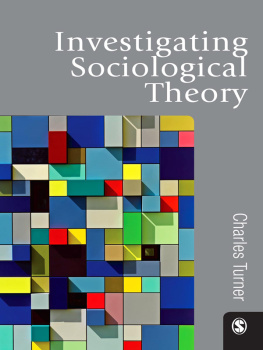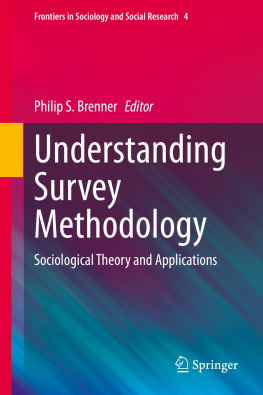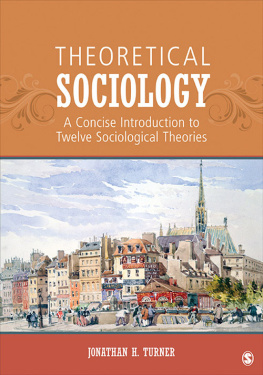Investigating
Sociological
Theory
In this authoritative and strikingly original book, Charles Turner demonstrates that sociological theory far from being some dry, boring meta-discourse of society is an ethically engaged enterprise, intimately connected to the arts of living in the contemporary world. Accessible to both students and seasoned practitioners, this book is at once a terrific defenvce and itself an elegant example of the continuing relevance and intellectual vitality of sociological theory. Turners brilliant discussion thoroughly deserves to resonate across the discipline of sociological theory in both its European and north American versions.
Thomas Osborne, University of Bristol
Investigating
Sociological
Theory
Charles Turner
Charles Turner 2010
First published 2010
Apart from any fair dealing for the purposes of research or private study, or criticism or review, as permitted under the Copyright, Designs and Patents Act, 1988, this publication may be reproduced, stored or transmitted in any form, or by any means, only with the prior permission in writing of the publishers, or in the case of reprographic reproduction, in accordance with the terms of licences issued by the Copyright Licensing Agency. Enquiries concerning reproduction outside those terms should be sent to the publishers.
SAGE Publications Ltd
1 Olivers Yard
55 City Road
London EC1Y 1SP
SAGE Publications Inc.
2455 Teller Road
Thousand Oaks, California 91320
SAGE Publications India Pvt Ltd
B 1/I 1 Mohan Cooperative Industrial Area
Mathura Road, Post Bag 7
New Delhi 110 044
SAGE Publications Asia-Pacific Pte Ltd
33 Pekin Street #02-01
Far East Square
Singapore 048763
Library of Congress Control Number: 2009930424
British Library Cataloguing in Publication data
A catalogue record for this book is available from the British Library
ISBN 978-1-84920-374-6
ISBN 978-1-84920-375-3 (pbk)
Typeset by C&M Digitals (P) Ltd, Chennai, India
Printed in India by Replika Press Pvt Ltd
Printed on paper from sustainable resources
Contents
Acknowledgements
This book has been a long time coming and even now its results feel provisional. Had it not been for several people they would be more so; firstly, life in todays university would be less rewarding were it not for students who either say things that surprise you or force you to think more clearly. Over the years there have been several who have contributed, often in ways of which they are not aware, to what I have written here. They are Jody Adams, Ian Ashbridge, Vivienne Boon, Simon Campbell, Luke Doggett, Katherine Ellett, Lucy Hewitt, Maarten Hillebrandt, Will Leggett, Andrew Nicholls, Minerva Ocolisan, Kevon Perry, Natalie Pitimson, Elisabeth Simbuerger, Angelica Thumala, Rolando Vazquez and Julie Walsh. I have benefited from conversations with and suggestions from friends and colleagues Ariadna Acevedo, Jim Beckford, Daniel Chernilo, Rachel Cohen, Tony Elger, Robert Fine, Mike Gane, Peter Lassman, Herminio Martins, and Jennifer Platt. For helping me sustain a long-running lament about the state of sociology and how it isnt like it was(nt) in our day a special mention should go to The Four Yorkshiremen: Mark Erickson, Paul du Gay, Graeme Gilloch and Tom Osborne.
The book is dedicated to the memory of Irving Velody, inspiring teacher and friend; while I am resigned to the thought that he might have rolled his eyes and guffawed in places, I would like to think that he would have been sympathetic to parts of it.
Finally, one more thing: thank you to my wife, Zeynep, without whom this book would have been finished earlier.
from Mary Douglas (2003) Natural Symbols: Explorations of Cosmology. Routledge (Routledge Classics), Diagram 4 (Grid and Group) page 60. Reprinted with permission.
from John Scott (1995) Sociological Theory, Aldershot, Edward Elgar. Reprinted with permission.
from Richard Munch (1988) The dispositions of the personality system, Understanding Modernity, Figure 9, p. 140. Routledge. Reprinted with permission.
from BONNER, ANTHONY; SELECTED WORKS OF RAMON LLULL 1232-1316, VOLUMES 1 AND 2: 1985 Princeton University Press Reprinted by permission of Princeton University Press.
from T. Parsons and N. Smelser (1958) Economy and Society. London: Routledge & Kegan Paul. Reprinted with permission from Neil Smelser.
from E. Gellner (1983) Nations and Nationalism. Oxford: Blackwell. Reprinted with permission.
from M.S. Archer (1982) Morphogenesis versus Structuration: on combining structure and action, The British Journal of Sociology, 33 (4): 44583. Reprinted with permission.
from Mary Douglas (2003) Natural Symbols: Explorations of Cosmology. Routledge (Routledge Classics), Diagram 4 (Grid and Group) page 60. Reprinted with permission.
from M. Douglas (1975) Implict Meanings, p. 224. London: Routledge & Kegan Paul. Reprinted with permission.
from E. Gellner Concepts and society, in B. Wilson (ed.), Rationality. Oxford: Blackwell. Reprinted with permission.
from A. Giddens (1984) The Constitution of Society. Cambridge: Polity Press. Reprinted with permission.
Introduction
This book is not an encyclopaedic survey of the most influential or important sociological theories of the 20th century; nor is it an institutional history of sociological theory. It is not a textbook, a distillation of the accumulated knowledge of a particular discipline; nor is it a crib, a set of ready-made and easily-remembered answers to imagined examination questions. It is more of a readers guide, a series of hints and suggestions for those who, whether students or teachers, believe that sociology is a profession and a discipline but also something more.
Sociology will be understood here as a mode of encounter with the social world and a mode of orientation within that world, and sociological theory as the articulation of the moves, problems and themes that arise in connection with this encounter. Orientation in the social world is a problem for actors as much as it is for professional sociologists, and so the moves, problems, and themes identified here as central to sociological theory will not be thought of as wholly distinct from those germane to living a life and being a competent social animal. Sociology will be understood as a discipline but also as a certain sort of sensibility, a mode of response to the world, a way of seeing. Whether sociological theory can equip anyone for the broader task of living a life will remain an open question, but hints about an answer will be offered towards the end.
Although sociologists are perhaps the last people one should turn to for advice in this direction, and while the personal lives of many of the great sociological theorists could hardly be described as a model for anyone, the lifes work of each is its own sort of instruction, being a sustained attempt to construe, constitute, frame, and interpret the social world. In this respect, however eccentric they might have been, they were no different from each one of us, for our social life would not be our social life were it not for our need and ability to frame our experience, to place it under a description. This does not mean that sociological theory is no more than an elaborate and more explicit version of what each of us has to do in order to live a life. If matters were so simple then much of the more baroque sort of sociological theory would be pointless (though some of it may well be), and we could say with Wittgenstein, in a maxim he did not always follow himself, that whatever can be said can be said clearly.






